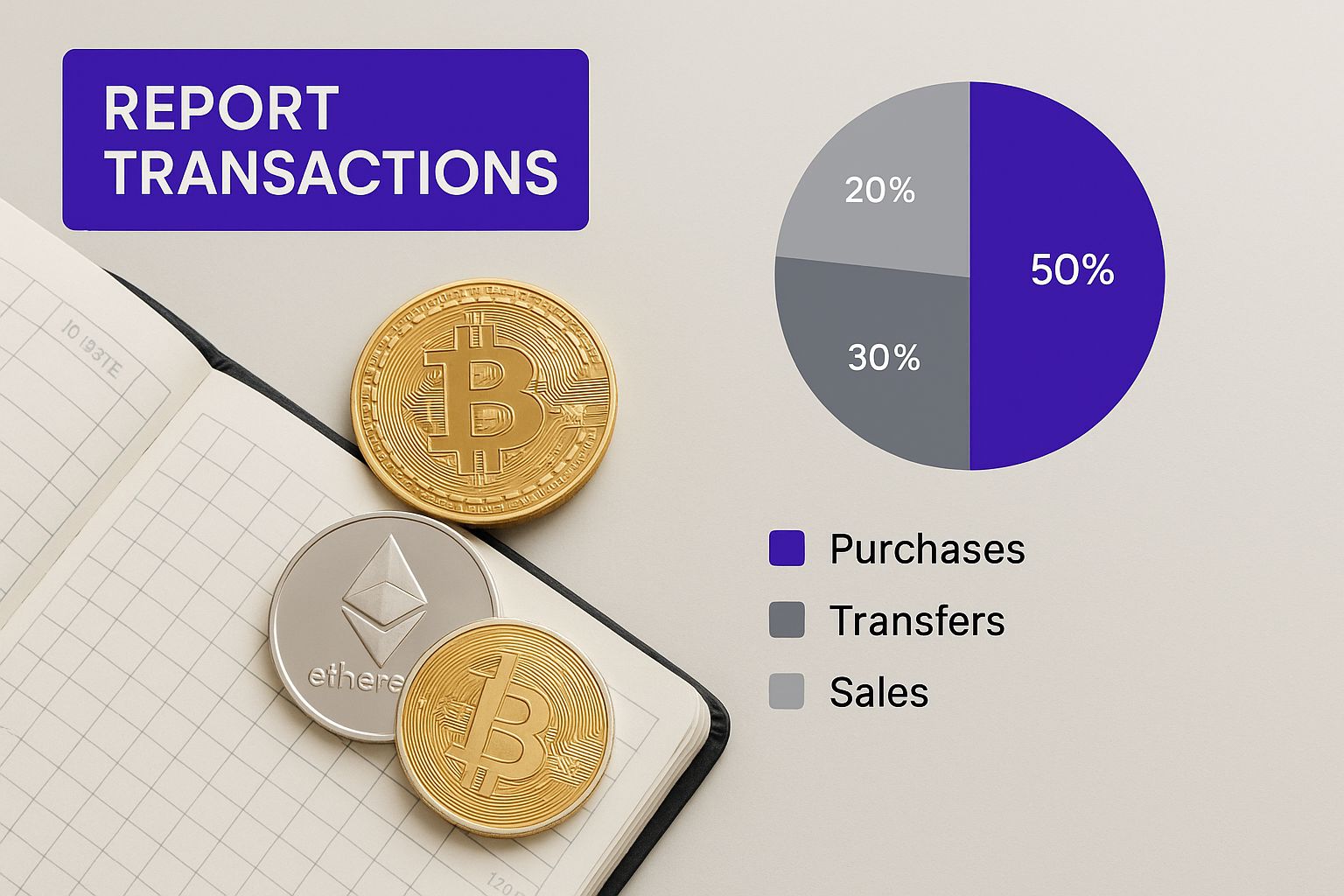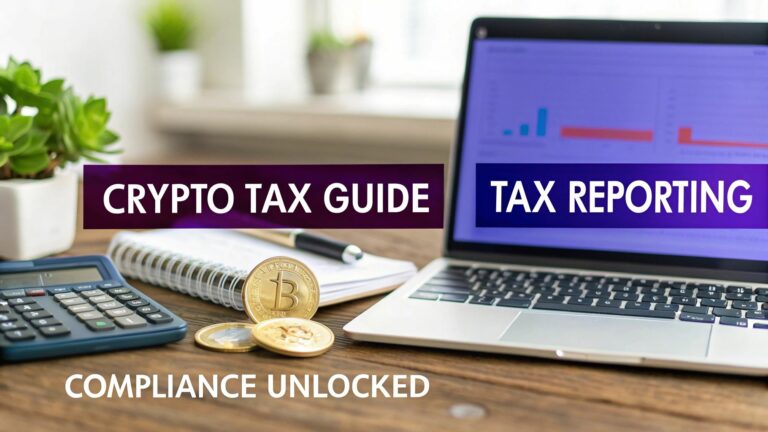When it comes to crypto, the heart of your tax reporting boils down to one simple idea: you have to report your capital gains or losses from selling, trading, or even spending your digital assets. Think of it like stocks. The IRS views your crypto holdings as property, which means almost every move you make is a taxable event that needs to be on the books.
Understanding Your Crypto Tax Reporting Requirements

Trying to get a handle on crypto taxes can feel like a heavy lift, but the basic principle is surprisingly straightforward. If you get rid of a digital asset and make a profit, the tax authorities want their cut. That one rule is the foundation for everything else.
The trick is figuring out what the IRS actually considers a "disposition" or a taxable event. It’s not just about selling your Bitcoin for US dollars. A ton of common crypto activities can trigger a tax obligation, and knowing what they are is the first real step to staying compliant.
What Is a Crypto Taxable Event?
It helps to think of your crypto portfolio like a collection of rare art. If you bought a painting for $100 and later sold it for $500, you’ve got a $400 gain that you have to report. Crypto works the exact same way. The second you complete a transaction, you've likely created a tax event.
To make this crystal clear, here’s a quick guide to some of the most common activities and whether they're taxable.
Quick Guide to Common Crypto Taxable Events
| Crypto Activity | Is It a Taxable Event? | What You Need to Report |
|---|---|---|
| Selling crypto for cash (e.g., BTC to USD) | Yes | Capital gain or loss on the sale. |
| Trading one crypto for another (e.g., BTC for ETH) | Yes | Capital gain or loss on the crypto you traded away. |
| Using crypto to buy goods or services | Yes | Capital gain or loss based on the market value at the time. |
| Getting paid in crypto | Yes | The market value of the crypto is taxed as ordinary income. |
| Receiving staking or mining rewards | Yes | The market value of the rewards is taxed as ordinary income. |
| Buying crypto with cash and holding it | No | No taxable event occurs until you sell, trade, or spend it. |
| Donating crypto to a qualified charity | No | Typically not taxable, and you might get a tax deduction. |
| Gifting crypto to someone | No (usually) | Not taxable for the sender, but gift tax rules may apply over certain limits. |
Understanding these distinctions is everything. It shifts the question from "Do I have to report my crypto?" to "How do I report all my crypto transactions?"
The days of crypto operating in a tax gray area are definitively over. Regulators are increasing their focus on digital assets to ensure these transactions are properly tracked and reported, aligning them with the standards for traditional financial services.
Crypto tax reporting is only getting more buttoned-up, especially in the United States. The IRS is very clear: you must report transactions using Form 8949 and Schedule D. And don't think you can fly under the radar. Major exchanges like Coinbase are now issuing 1099 forms straight to the IRS, making it much harder to slip up.
These new measures signal a huge shift toward a more transparent, data-driven tax world. If you want to get ahead of the curve, you can dive deeper into these topics with the resources in our vTrader Academy.
Mastering the Essential IRS Tax Forms
Wrapping your head around the fact that almost every crypto move is a taxable event is the first big step. The next, of course, is figuring out where to actually report all this activity. IRS paperwork can feel like a labyrinth, but for crypto investors, it really comes down to two key forms that work hand-in-hand to tell your financial story.
Think of them as a dynamic duo: one form breaks down the play-by-play details of every trade, while the other gives the final score. Getting comfortable with how they interact is the secret to getting your crypto tax reporting right.
Your Crypto Tax Reporting Team: Form 8949 and Schedule D
For reporting your crypto capital gains and losses, the two documents you absolutely need to know are Form 8949 and Schedule D. They are completely intertwined, yet each has its own distinct job.
-
Form 8949, Sales and Other Dispositions of Capital Assets: This is your detailed transaction log. Every single time you sell or trade crypto, you'll list it here as a separate entry. This is where you document the nitty-gritty of each transaction.
-
Schedule D, Capital Gains and Losses: This is the summary sheet. After you’ve meticulously listed every single transaction on Form 8949, you’ll carry the totals over to Schedule D. This form is what calculates your total net gain or loss for the year.
In short, Form 8949 provides the proof and the detailed breakdown, while Schedule D gives the IRS the final, bottom-line number. You simply can't file one without the other when you have crypto sales to report.
A Closer Look at Form 8949
Form 8949 is where the real work happens. It might look intimidating with all its rows and columns, but the information it requires is pretty straightforward once you get the hang of it. Let’s break down the key columns you'll be filling out for every crypto transaction.
- (a) Description of property: Here, you'll just state what you sold, like "0.5 BTC" or "10 ETH."
- (b) Date acquired: This is the date you originally bought or otherwise received the specific crypto you sold.
- (c) Date sold or disposed of: This is the date you pulled the trigger on the sale, trade, or other transaction.
- (d) Proceeds (sales price): The total value in U.S. dollars you received for the crypto on the day you sold it.
- (e) Cost or other basis: Your original purchase price in U.S. dollars, plus any fees you paid to acquire it. Keeping a close eye on trading fees is crucial, as they can often be added to your cost basis, which can reduce your taxable gain. Understanding how various crypto trading fees are structured can really help you get this part of the calculation right.
- (h) Gain or (loss): This is the moment of truth—your proceeds minus your cost basis.
Real-World Example: Let's say you bought 0.1 Bitcoin for $3,000 back on February 1, 2023. You held on and later sold it on November 15, 2023, for $3,500. On your Form 8949, you'd report a gain of $500 ($3,500 proceeds – $3,000 cost basis).
Answering the Form 1040 Virtual Currency Question
Beyond these two core forms, there’s a simple but critically important question staring you right in the face at the top of your main tax return, Form 1040. It asks if you "received, sold, exchanged, or otherwise disposed of any financial interest in any virtual currency."
There's no room for interpretation here; answering this question accurately is a mandatory part of your tax filing.
For pretty much anyone actively involved in crypto, the answer will be a clear "Yes." Ticking this box is your way of telling the IRS to expect to see your detailed reports on Form 8949 and Schedule D. Trying to skirt this question can lead to some serious penalties, so it’s essential to be truthful, even if all your crypto adventures ended up in a net loss for the year.
Calculating Your Crypto Gains and Losses
This is where the rubber meets the road. All the theory about crypto taxes boils down to translating your trading history into the cold, hard numbers the IRS demands. Calculating your capital gains and losses is the single most important part of the process, and while it requires a sharp eye for detail, it's more of a methodical task than a cryptic puzzle.
At its heart, the formula is surprisingly simple: Sale Price – Cost Basis = Gain or Loss. The real legwork is in nailing down your cost basis for every single transaction you’ve made. Think of the cost basis as the total, all-in price you paid to acquire your crypto, including the purchase price and any pesky transaction fees. It's the starting line for measuring your profit or loss.
This is why meticulous record-keeping isn't just a good idea—it's the foundation of getting your taxes right.

As you can see, an organized ledger is what separates a smooth tax season from a stressful one.
Understanding Your Cost Basis
Your cost basis is more than just the price you paid for a coin. It’s the total investment to get that asset into your wallet. This includes any trading fees, exchange commissions, or gas fees you paid along the way. Forgetting to add these fees is a rookie mistake that can inflate your gains and leave you paying more tax than you actually owe.
Every taxable event forces you to look back at this cost basis. For instance, knowing how to convert cryptocurrency to cash is crucial, as each time you sell for fiat, you lock in a gain or loss based on that original cost.
Another key piece of the puzzle is the holding period—simply how long you held an asset before you sold it. This determines if your gain is short-term (held for one year or less) or long-term (held for more than one year), which directly impacts the tax rate you'll pay.
Choosing Your Accounting Method
Now we get to the strategic part. If you’ve been buying the same crypto at different prices over time (hello, dollar-cost averaging!), how do you decide which cost basis to use when you finally sell? The IRS gives you a couple of options, and your choice can have a massive impact on your tax bill.
The two main contenders are:
- First-In, First-Out (FIFO): This method assumes the first coins you bought are the first ones you sell. It’s the default and the most straightforward approach, but it can lead to higher tax bills in a bull market.
- Specific Identification (Spec ID): This powerful method lets you cherry-pick which specific units of crypto you're selling. This gives you ultimate control to optimize your taxes—for example, by selling coins bought at a higher price to minimize your reported gains.
To use Spec ID, you absolutely must have pristine records that prove which specific coins you sold and when.
The accounting method you pick isn't a minor detail; it's a strategic weapon. For active traders, the difference between FIFO and Specific ID can easily translate into thousands of dollars in tax savings in a single year.
FIFO vs. Specific ID: A Head-to-Head Comparison
Let's break down just how much of a difference this choice can make. Imagine you have this Bitcoin purchase history:
- January: Bought 1 BTC for $30,000
- June: Bought 1 BTC for $50,000
In December, you decide to sell 1 BTC when the price hits $60,000. Here’s how the two methods play out.
FIFO vs Specific ID Accounting Methods
| Transaction Detail | FIFO Method Calculation | Specific ID Method Calculation | Taxable Gain/Loss |
|---|---|---|---|
| Sell 1 BTC for $60,000 | Uses the first BTC bought in January. Calculation: $60,000 (Sale Price) – $30,000 (Cost Basis) | You choose to sell the BTC bought in June. Calculation: $60,000 (Sale Price) – $50,000 (Cost Basis) | FIFO: $30,000 Gain Specific ID: $10,000 Gain |
As the table shows, simply by choosing the Specific Identification method, you were able to slash your taxable gain by a staggering $20,000.
This example perfectly illustrates why understanding these accounting methods is a cornerstone of smart crypto tax planning. While FIFO is certainly simpler, taking the time to specifically identify your assets can lead to major financial wins come tax time.
Navigating Complex Crypto Tax Scenarios
The world of crypto has exploded far beyond simply buying and selling Bitcoin on an exchange. Once you dive into activities like staking, DeFi lending, or flipping NFTs, your crypto tax reporting requirements get a whole lot more interesting. Getting these complex situations right is the key to staying compliant and avoiding a headache from the IRS down the road.
Think of it like this: if simple trades are basic math, these advanced scenarios are the algebra of crypto taxes. They demand more attention to detail, but don't worry—the core concepts of tracking your income and cost basis are still the foundation for everything.
What to Do with Staking Rewards
Staking has become a go-to method for earning passive income on crypto you're holding for the long term. But those rewards aren't free money in the eyes of the taxman. The IRS treats staking rewards as ordinary income, much like the interest you'd earn from a traditional bank account.
When you get those rewards, you need to record their fair market value in U.S. dollars at the very moment they hit your wallet. That value gets taxed at your normal income tax rate.
Just as important, that income figure also sets the cost basis for those new coins.
Example: Let's say you're staking ETH and receive 0.1 ETH in rewards. On that day, ETH is trading at $3,500. You have to report $350 ($3,500 x 0.1) as ordinary income on your tax return. Now, the cost basis for that 0.1 ETH is locked in at $350, which you'll need if you ever decide to sell it.
DeFi Lending and Airdrops
Decentralized Finance (DeFi) has unleashed a tidal wave of new financial activities, and almost all of them have tax implications. Two of the most common you'll run into are lending and airdrops.
- DeFi Lending: If you lend out your crypto on a platform and earn interest, that interest is considered ordinary income. Just like with staking, you report the fair market value of the interest you receive at the time it's paid.
- Airdrops: Getting free tokens from an airdrop is also a taxable event. The full fair market value of those tokens at the moment you gain control of them is considered ordinary income. Your cost basis for these shiny new tokens is whatever value you reported.
In both cases, the logic is the same: whenever you get new crypto without buying it directly, its value at that moment is almost always treated as income.
How to Report NFT Transactions
The IRS views Non-Fungible Tokens (NFTs) as property, putting them in the same bucket as cryptocurrencies. But their unique nature as "collectibles" throws a curveball into your tax reporting.
When you sell an NFT, you'll have a capital gain or loss, which is the sale price minus your cost basis. The catch? Because they are collectibles, long-term capital gains from NFTs are taxed at a much higher rate—up to 28%. That’s a big jump from the standard 0%, 15%, or 20% rates for other assets like stocks or crypto.
Here's a quick breakdown of how common NFT activities are taxed:
| NFT Activity | How It's Taxed | What You Need to Report |
|---|---|---|
| Buying an NFT | Not a taxable event. | You establish your cost basis (purchase price + gas fees). |
| Selling an NFT | Capital Gain/Loss. | The difference between your sale price and cost basis. |
| Minting & Selling an NFT | Ordinary Income + Capital Gain. | Income from the initial sale, then capital gains on future sales. |
| Trading one NFT for another | Capital Gain/Loss. | You "dispose" of your original NFT, triggering a taxable event. |
Pro tip: Meticulously track your gas fees for every single NFT transaction. Those fees get added to your cost basis, which can significantly lower your taxable gains when you sell.
Receiving Crypto as Payment for Goods or Services
Getting paid in crypto for your work or for selling products creates a two-step tax situation that trips up a lot of people. It’s crucial to handle both parts correctly.
First, the crypto you receive is taxed as ordinary income. You must report its fair market value in U.S. dollars on the day you got paid. This counts toward your regular business or personal income.
Second, that reported value instantly becomes your cost basis in that crypto. If you hold onto it and its price goes up before you sell or trade it, you'll have a capital gain. This two-part process is a common source of error, so make sure you're tracking both the income and the subsequent capital gain or loss.
Building a Bulletproof Record-Keeping System
When it comes to crypto taxes, one truth stands above all else: meticulous records are everything. A lot of people treat their transaction history as an afterthought, but that's a one-way ticket to a brutal tax season.
Think of it like building a house—if the foundation is weak, the whole structure will crumble. A rock-solid system isn't just about staying compliant; it's your ironclad defense if the IRS ever comes knocking. This mindset shifts tax season from a frantic scramble to a simple, manageable task.
The Essential Data Points for Every Transaction
Your records need to paint a full picture. Just knowing you bought some Bitcoin isn't nearly enough. For every single taxable event—selling, trading, or even getting staking rewards—you have to track the nitty-gritty details.
To keep the IRS happy, your log must include:
- Date Acquired: The day you first got the asset.
- Date Sold or Disposed: The day you sold, traded, or used it.
- Asset Type: Which crypto was it? (e.g., BTC, ETH, SOL).
- Amount: How much of the crypto did you get rid of?
- Cost Basis: Your total cost in USD to get the asset, including fees.
- Sale Proceeds: The fair market value in USD you got back.
- Transaction Fees: Any fees you paid in USD to complete the sale.
Without this information, you can't accurately calculate your gains and losses, which defeats the entire purpose. And for more complex situations like yield farming or staking, you have to be just as diligent. To get a better handle on how those earnings work, you can explore our crypto staking options and see the kind of data you'll need to track.
Choosing Your Record-Keeping Method
How you decide to track all this really boils down to how active you are. An investor who makes a few trades a year has totally different needs than a full-time degen.
-
Spreadsheets: If you're just starting out with a handful of transactions, a simple spreadsheet might do the trick. Just create columns for the key data points and commit to updating it religiously. Pros: It's free and straightforward. Cons: It’s incredibly easy to make a mistake, and it becomes a nightmare as your activity grows.
-
Crypto Tax Software: For anyone doing more than just a few trades, specialized software is non-negotiable. These tools plug directly into your exchanges and wallets, automatically pull in your history, and sort everything out for you. Pros: They're highly accurate, save you a ton of time, and spit out the exact forms you need, like Form 8949. Cons: They usually come with a subscription fee.
Keeping detailed records is not optional. The IRS generally has three years to audit a tax return, but that window can stretch to a whopping six years if you've significantly underreported your income. Your records are the only thing that can prove your numbers are correct.
At the end of the day, whether you're using a spreadsheet or dedicated software, the core principle is the same. Consistent and accurate record-keeping is the bedrock of staying compliant and sleeping well at night.
Understanding Global Trends in Crypto Tax Enforcement

Cryptocurrency might not respect borders, but tax authorities around the globe are certainly starting to. The freewheeling days of digital assets flying under the regulatory radar are coming to a swift end. A major international push is underway to pull crypto into the formal tax system, and the United States is front and center in this global compliance movement.
What does this mean for you? Hiding assets offshore is becoming a thing of the past. Tax agencies are no longer siloed; they're sharing data and working together to ensure every taxpayer meets their obligations, no matter where their crypto is stashed. Grasping this global picture is vital for any U.S. investor.
The Rise of International Cooperation
Spearheading this new era of collaboration is the Crypto-Asset Reporting Framework (CARF), a brainchild of the Organisation for Economic Co-operation and Development (OECD). Think of CARF as a global information-sharing pact designed specifically for digital assets. It creates a standardized playbook for countries to automatically swap taxpayer information on crypto transactions.
This framework is a total game-changer. It establishes a unified front, making a crypto transaction in one participating country visible to tax authorities in another. For U.S. taxpayers, this gives the IRS unprecedented visibility into overseas crypto accounts and activities, dialing up the pressure for accurate reporting.
By requiring detailed reporting of digital asset transactions, global regulations aim to close tax gaps and provide greater visibility into taxable activities, reducing the risk of non-compliance.
This coordinated effort is a clear signal that regulators no longer see crypto as a fringe hobby. Instead, it's viewed as a permanent fixture of the financial world that needs to be taxed properly. The trend is undeniable: more transparency, more data sharing, and tougher enforcement are the new normal.
Global Compliance a Mixed Picture
As of 2025, a solid 78% of the world's largest economies have rolled out formal crypto taxation policies, signaling a massive global shift. But adoption doesn't always equal compliance. In the United States, an estimated 65% of crypto investors reported their crypto income in 2024.
This stands in contrast to Australia's impressive 72% compliance rate, which is boosted by the government's use of automated data-matching software. Meanwhile, nations like Canada and the UK are seeing their own compliance rates climb, thanks to a mix of stricter enforcement and better taxpayer education. For a deeper dive, you can explore more data about global crypto tax laws on coinlaw.io.
These international enforcement strategies confirm that the IRS's focus on crypto isn't happening in a vacuum—it's part of a much larger, coordinated global movement. As data sharing becomes more seamless, keeping meticulous records and fully complying with your tax obligations has never been more critical. To stay on top of it all, you can follow the latest market developments on our crypto news hub.
Frequently Asked Questions About Crypto Taxes
Even when you feel like you've got a handle on the rules, crypto taxes can still throw a few curveballs. Let's clear the air and tackle some of the most common questions that pop up, so you can file with total confidence.
Do I Have to Report Crypto if I Only Bought It and Never Sold?
Nope. If you simply bought some crypto and have been holding onto it (or "HODLing," as they say), you haven't triggered a taxable event in the U.S. A taxable event only kicks in when you actually cash in on a gain or a loss—think selling, trading, or spending your crypto.
But don't get too comfortable. You still have to answer that virtual currency question on your Form 1040. The wording has changed over the years, so it’s critical to read it carefully and answer truthfully based on the IRS guidance for the specific tax year you're filing.
What Happens if I Fail to Report My Crypto Taxes?
Let's be blunt: ignoring your crypto tax obligations is a bad idea. The IRS is not playing games and has the power to bring down some serious penalties if they catch you.
We're talking about consequences like:
- Accuracy-related penalties, which can tack on an extra 20% to the tax you underpaid.
- Civil fraud penalties, which can jump to a whopping 75% of the underpayment.
- Criminal charges, which are reserved for the most serious cases of deliberate tax evasion.
The days of flying under the radar are long gone. The IRS gets data directly from crypto exchanges and uses sophisticated blockchain analysis tools to find people who haven't filed. It's always a smarter move to amend a past return and pay what you owe than to wait for an audit notice and face much harsher consequences.
Is Using Crypto Tax Software a Good Investment?
Absolutely. If you've done more than just a handful of transactions, trying to track everything in a spreadsheet is a recipe for disaster. It's not just tedious; it's incredibly easy to make a costly mistake.
Crypto tax software is a lifesaver. It automatically syncs with your exchanges and wallets, calculates all your gains and losses, and spits out the exact forms you need, like Form 8949. The cost is usually a drop in the bucket compared to the hours you'll save and the peace of mind you'll get from accurate reporting.
For a deeper dive into other common questions, our comprehensive FAQ page has plenty more answers.
Ready to trade with zero commission and get the tools you need for smarter investing? Join vTrader today and start building your portfolio with a $10 sign-up bonus. Sign up now at https://www.vtrader.io.

Steve Gregory is a lawyer in the United States who specializes in licensing for cryptocurrency companies and products. Steve began his career as an attorney in 2015 but made the switch to working in cryptocurrency full time shortly after joining the original team at Gemini Trust Company, an early cryptocurrency exchange based in New York City. Steve then joined CEX.io and was able to launch their regulated US-based cryptocurrency. Steve then went on to become the CEO at currency.com when he ran for four years and was able to lead currency.com to being fully acquired in 2025.


